As Liverpool know all too well, a pattern is emerging when it comes to Real Madrid‘s transfer strategy. Now, the Reds must now take action to ensure they hold the cards over Ibrahima Konate‘s future.
Florentino Perez walks about European football like he’s John Gotti in a tailored suit – untouchable, unbothered, always a step ahead. Not because he’s as powerful as he thinks he is, but because the football world allows him to operate that way.
UEFA look the other way, FIFA stay silent and clubs too often act with politeness while Madrid act with precision.
This isn’t transfer business, it is the quiet domination of a system that Madrid have turned into a weapon.
Real Madrid’s transfer approach

This isn’t a clever loophole. The rule is clear: clubs aren’t allowed to negotiate with players until they are into the final six months of their contract.
But with Madrid, the timing always seems to raise questions. Fluency in a new language; decision dates that quietly precede the legal window; carefully-timed media leaks that build inevitability before negotiations are even supposed to begin.
No rules are broken, at least not on paper, but when the same story plays out repeatedly – with David Alaba, Antonio Rudiger, Kylian Mbappe, Trent Alexander-Arnold – you’re left wondering whether Madrid are simply more strategic or whether everyone else is choosing to look the other way.
This isn’t new, it’s just becoming impossible to ignore.
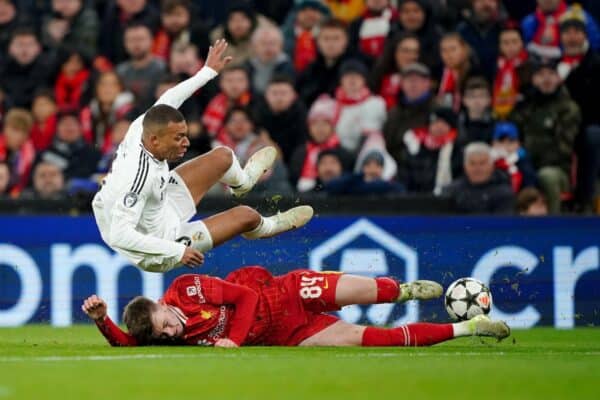
Alaba left Bayern Munich for nothing in 2021 after months of rumours, most of which conveniently originated in Spain. Rudiger walked away from Chelsea the following summer, again with Real Madrid already in position long before the deal was official.
These weren’t panic buys or late opportunities, they were calculated long games, publicly denied until the moment they were confirmed.
Then came Mbappe. For years, Marca and AS published story after story about Madrid’s interest. Paris Saint-Germain spent staggering sums to keep him.
The French president even got involved but the story always ended the same way, the player signing for Madrid on a free with a huge signing bonus and a smile. Everyone saw it coming. No one stopped it.
This is not silence. It’s a media campaign, a slow, orchestrated weakening of a player’s ties to their club, reinforced by the perception that Madrid is always the final destination.
Arne Slot, himself, has spoken about the problem:
“If my memory is correct, I think it happens mostly with a certain club that brings free agents in, and you don’t see it that much at other big clubs…yet.
“But I cannot predict the future, so I don’t know what’s going to happen, but it happened a few times now, but I also see a lot of players moving for big transfer fees in every single window in the last three, four or five years.
“So, it could be a Trent…trend. Funny word, by the way.”
When the mask slips
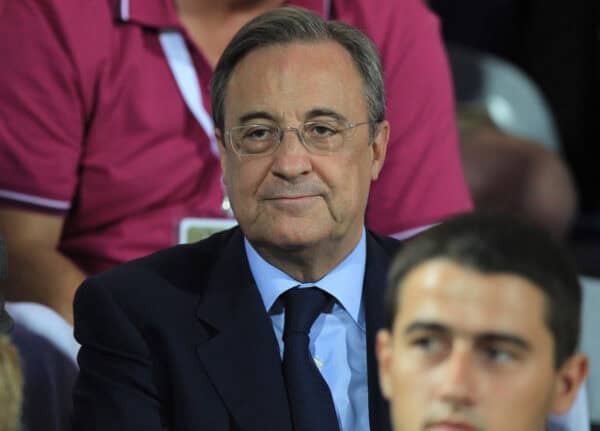
Alexander-Arnold’s move to Madrid followed the same pattern except this time, the evidence was even clearer.
Well-practiced Spanish at the unveiling, no serious interest from any other major club, that seems unthinkable. A generational talent on a free transfer, why weren’t there more suitors?
There was even a press conference slip in which he admitted he had “been waiting a long time” for the move, before correcting himself to “a few weeks.”
He also said he decided on the move in March, but his tears during the PSG game told a different story. Maybe that was the realisation it was his last-ever European night under the Anfield lights.
That’s not coincidence, that’s choreography.
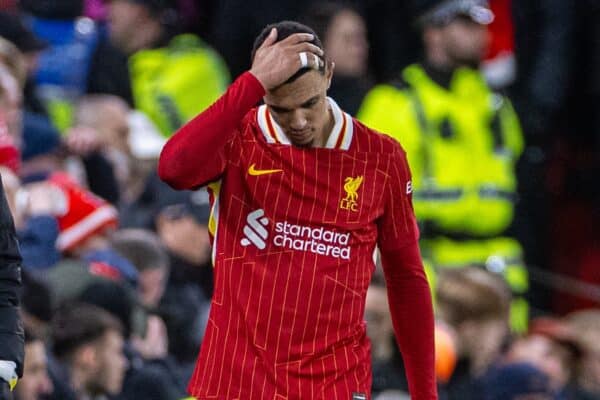
Fluency in a language doesn’t happen in six months and certainly not in the middle of a Premier League season. This was planned, prepared, all but finalised before anyone at Liverpool realised what was happening – or at least, before they admitted it.
This isn’t a dig at Trent, players are entitled to move, but it’s the manner of it, the lack of transparency, the slow motion inevitability that shows how Madrid’s model really works.
And once again, Liverpool were left to hold the door open and smile.
To their credit, Liverpool did stand firm in the end, demanding and securing a £10 million fee from Madrid so Trent could feature in the Club World Cup.
But that late show of resolve only raises another question, how much more could they have received if they had taken control a year earlier?
That £10 million wasn’t a transfer triumph, it was salvage work, a last-minute response to a situation that should never have been dictated by the player or the buying club. It should have been done on Liverpool’s terms, all of it.
More broadly, this creates a disparity between clubs.
While one club benefits from saving money on a transfer fee, the other loses the ability to reinvest. It distorts the European landscape and weakens the competition. It creates imbalance that favours the powerful and those who know how to manipulate the rules.
Myles Lewis-Skelly and the next wave

It isn’t just Liverpool. Arsenal’s highly-rated teenager Myles Lewis-Skelly is reportedly another player Madrid want to prise away for free.
His contract runs until 2026, but stories have already emerged linking him with a pre-planned exit. Despite being only 17 years old, the signs are worryingly familiar: long-term admiration, stalled renewal talks and subtle pressure building in the background.
And he’s not alone.
Real Madrid are said to be monitoring a whole wave of players whose deals end in 2026, including Valencia’s Cristhian Mosquera, Bayern’s Dayot Upamecano, AC Milan‘s Theo Hernandez and PSG’s Gianluigi Donnarumma.
In each case, the rhythm is the same: no formal contact, no rule-breaking, just timely stories and scouting presence designed to position Madrid as the inevitable end point.
The messaging is quiet but deliberate. The media framing isn’t accidental, it’s part of the machinery – Marca and AS do the heavy lifting. Club sources deny interest until it’s convenient and Madrid, like a boss who never leaves fingerprints, maintain plausible deniability while everyone else plays by rules that no longer apply.
Ibrahima Konate: The next target?

And now Madrid circle again.
Konate has a year left on his deal. Talks over a new contract have been ongoing since November but have now stalled.
According to the Guardian, Liverpool’s first offer was incentive-heavy, but what’s unclear is whether any offer, however structured, would be enough to sway the player.
Once Madrid’s interest is in the air, negotiations begin to feel performative. Is this really about money, or is it already about Madrid?
Meanwhile, the media groundwork is already being laid: ‘monitoring the situation’, ‘a player admired by Xabi Alonso’, ‘one to watch in 2026’. It is all painfully familiar.
No illegal contact, no formal bids, just the slow, predictable drip of narrative that primes a move well before it happens. And if Liverpool don’t act now, decisively, they will lose another elite player without a fee.
You can’t force a player, but you can prepare
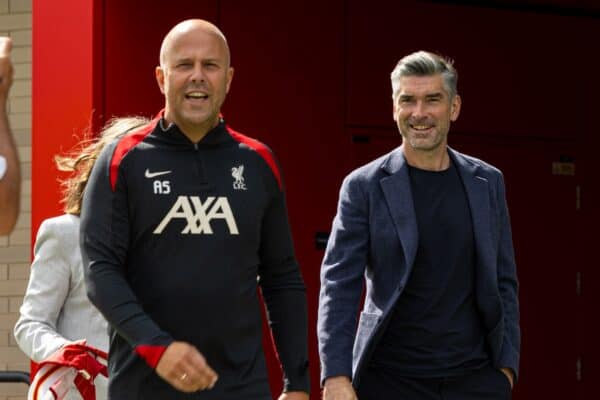
Some will argue that Liverpool can’t sell if Konate doesn’t want to leave. And on paper, they’re right. No club can force a player out against his will, but that’s not what this is about. It is about regaining control before Madrid take it from us.
We are not talking about putting a player on the bench out of spite, we’re talking about making firm, forward-thinking decisions.
If a player won’t commit to the club long-term, then the club has to prepare for life without him – and that starts by signing competition.
If you strengthen the position and his minutes reduce naturally, then you have protected yourself and sent a message that contracts have consequences.
In a year that ends with a World Cup, players want rhythm, they want visibility, they want to play. That’s leverage, not punishment. That’s how serious clubs handle major assets.
Yes, it might cost money short-term, but letting another £50 million player walk for free? That’s not loyalty, that’s mismanagement.
Time to set the terms
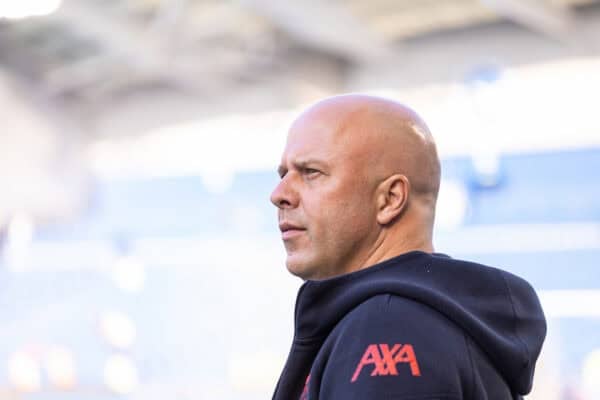
Liverpool do not need to posture and they certainly do not need to imitate Madrid.
What they must do is protect their own interests with the same clarity and conviction that has underpinned the club’s greatest eras.
This is still Liverpool Football Club of six European Cups, a global fanbase and a squad capable of challenging for major honours. The strategy that once relied on smart recruitment and calm negotiation now needs to be paired with firmer lines in the sand.
Madrid never hesitate to shape a situation in their favour and the rest of Europe rarely calls them on it. Liverpool should not mirror that approach, but neither should they accommodate it.
With players like Konate, the message has to be uncomplicated, to commit to the project or create the space for someone who will.
Decisive action, whether that means an early sale or a robust new contract, re-establishes control and ensures the terms are Liverpool’s, not Madrid’s.
Being proactive here is not an act of aggression, it is modern football governance. It signals to every dressing room and every agent that Liverpool’s future will not be dictated by external agendas.
Breaking the cycle

Madrid’s strategy is not genius. It’s not revolutionary. It’s just shameless and effective.
They bend the rules because no one enforces them. They act with impunity because too many clubs still believe in old-world loyalty.
Liverpool must break that cycle and sell Konate if he won’t sign.
They must carry on the sentiment showed by holding out for the Trent fee, make it clear that we are no longer the soft touch, that we’re no longer standing still while Madrid write the ending for us.
Because, if we don’t, this will keep happening. The door will always be open and Perez, acting like the kingpin he believes himself to be, will walk right through it.












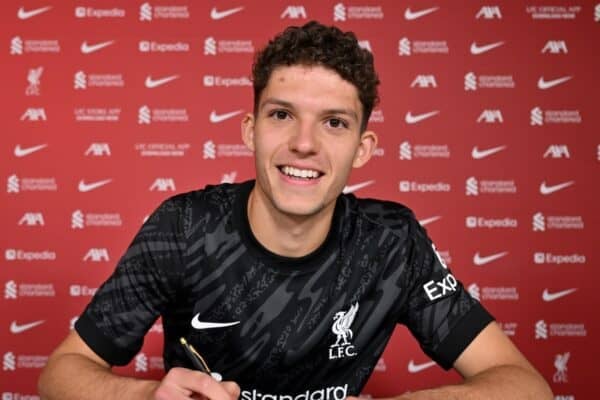




Fan Comments